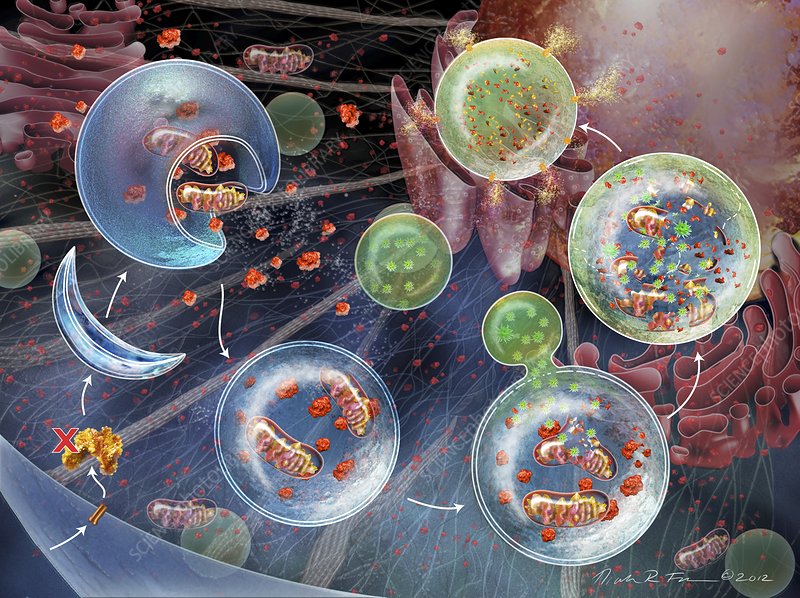According to the study “The Roles of Autophagy in Cancer” by Chul Won Yun et al., autophagy is an intracellular degradation process. It occurs under stressful conditions, such as organelle damage, abnormal protein presence, and nutrient deprivation. Regulation of autophagy plays a dual role in tumor suppression and advancement in many cancers. In addition, autophagy controls cancer stem cell properties by contributing to the maintenance of stemness, induction of relapse, and development of resistance to anticancer drugs. However, further research is needed on the exact mechanism of autophagy in cancer, as it also plays a role in tumor suppression and promotion.
Hence, I would like to share the study with you on the effect of fucoidan on autophagy, “TFEB-dependent autophagy is involved in scavenger receptor OLR1/LOX-1-mediated tumor progression” by Can Li et al.
Autophagy is an evolutionarily conserved catabolic pathway required to maintain cellular homeostasis. In cancer, the tumor cell-intrinsic effects of autophagy are highly context-specific, which could promote cancer cell survival or induce programmed cell death. In this study, they show that OLR1/LOX-1 (oxidized low-density lipoprotein receptor 1). It’s a scavenger receptor highly expressed in esophageal cancer cells and is involved in tumorigenesis by suppressing autophagic cell death. Mechanistically, OLR1 binding to RACK1 activates MAP2K/MEK-MAPK/ERK signaling, leading to TFEB (transcription factor EB) being trapped outside the nucleus and inhibiting autophagy. In addition, they identified a polysaccharide that causes the degradation of OLR1 and suppresses this autophagic pathway to inhibit tumorigenesis. This study demonstrates innovative molecular mechanisms underlying the tumor-suppressive effect of autophagy and provides therapeutic insight for esophageal cancer.
Considering the critical role of OLR1 in esophageal carcinogenesis (EC), the research included exploring strategies to inhibit OLR1 signaling as a potential anticancer approach for EC treatment. Fucoidan, a sulfated polysaccharide from marine brown algae, directly binds to OLR1 and induces proteasomal degradation. By administering fucoidan to wild-type EC and OLR1-knockout EC models, the study found that fucoidan dramatically inhibited EC proliferation in vitro and in vivo. They reduced the inhibitory effect in the OLR1-deficient state. These results suggest that genetic ablation of OLR1 or bioactive polysaccharides targeting OLR1 are promising interventions for Esophageal Carcinogenesis.
In conclusion, the study reveals that OLR1 coupled with the intracellular adapter protein RACK1 promotes RAS-MAP2K/MEK-MAPK/ERK signaling for TFEB-dependent autophagy inhibition and EC promotion. (See Figure. 1) This pathway could be blocked by sulfated polysaccharide fucoidan. Also, they identified this as an intervention strategy to inhibit esophageal tumorigenesis through decreased OLR1 stability through ubiquitination-dependent degradation. The OLR1 in human endothelial cells is upregulated by ox-LDL and activates NFKB (nuclear factor kappa B), producing pro-inflammatory effects. It is essential for tumor immune responses. The results also suggest that genetic ablation of OLR1 or bioactive polysaccharides targeting OLR1 are promising interventions for EC. However, the crosstalk between cancer cells and the host immune system is highly complex and multifaceted. Nevertheless, further mechanistic studies on immune functions regulated by OLR1 in ECs are needed.

Source: Autophagy. 2022; 18(2): 462–464. doi: 10.1080/15548627.2021.2012970
